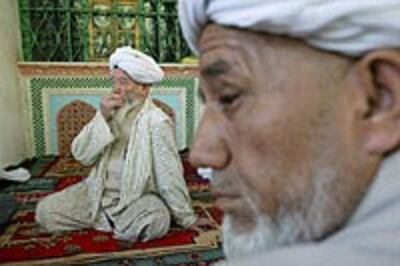
HONG KONG—Two Uyghur officials in northwest China have said forced abortion and conflict over religious issues lay behind the killing of a Communist Party village official earlier this year, which led to the trial and execution of two Uyghur young men for murder, religious extremism and separatism.
Sulayman Obul, 30, and Abdurehim Husseyin, 19, were executed in April after being convicted of murdering Matsalihan Ahmet, their local village Party secretary in Karkash County, around 2,000 kms to the south-west of Urumchi, local media reported.
But while the Urumchi-based Modern Xinjiang newspaper recorded Matsalihan's death as an honorable one, it did not report allegations that the late village Party chief had opposed the building of a new mosque, or that the slain man had tried to force Sulayman Obul's wife to abort the baby she was carrying.
"The two people now...we gave them the death penalty and they lost their political freedom and status and the penalty has been executed," Karkash County government official Tursun Niyaz confirmed to RFA's Uyghur service.
Religious tensions abound
"One of them was the Imam's son and other one was the preacher's son. One of them, Sulayman, was the son of the Imam of the Ulughata mosque," he said.
Imams and other religious educators are frequently targeted by Beijing, which fears an Islamist uprising against Chinese rule, which is deeply unpopular in the region.
He said the two men were found guilty of intentional murder, religious extremism, and separatism by the Intermediate People's Court in Hotan, a city 23 kms southeast of Karkash.
Current village Party secretary Erkin [one name correct] confirmed that forced abortion was at issue between Sulayman and Matsalihan prior to the killing.
"It is true, once he, Matsalihan, had asked Sulayman Obul to have his wife abort their child during a family planning meeting," Erkin said.
"He criticized him, saying his wife was pregnant year after year," he added.
Dead official 'loyal' to Party
"The family planning rules say a family must wait for three years before they can have permission," Erkin said. "They cannot have children every year. They can have three children, but it must be done during nine years...but they must be only one every three years."
Asked whether it was against the religious beliefs of Muslims, for whom abortion is a sin, Erkin replied: "Right! But there are plenty of things like that. If the woman is pregnant before the end of the third year, it happens everywhere," he told RFA.
Asked about his understanding of the motive behind the killing, Tursun Niyaz said: "Well, they are, er [audible sigh], we may call them religious extremists. In the Uyghur language, we might call them hot-blooded or paranoid–people who do not know what they are doing. "
"This killing was an accident," he said, in contrast to the court verdict of intentional homicide.
"[Matsalihan Ahmet] was the Party leader of the village. He was the only loyal representative of the party in the village. Second of all, he was continuously fighting against illegal religious activities and separatism and religious extremism," he added.
And replying to allegations by local residents that Matsalihan Ahmet had blocked the buiding of a new mosque for the village, Tursun Niyaz said:
"They had planned to attack the government officials who enforce [Chinese] law, because the religious extremists believe that the officials are strict with religious practices and with family planning rules."
"It is not about opposing building mosques because there are mosques here and they had built mosques with help of Matsalihan," he told RFA.
Original reporting by RFA's Uyghur service. Service director: Dolkun Kamberi. Produced for the Web in English by Luisetta Mudie.
